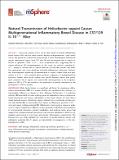Natural Transmission of Helicobacter saguini Causes Multigenerational Inflammatory Bowel Disease in C57/129 IL-10−/− Mice
Author(s)
Mannion, Anthony; Shen, Zeli; Feng, Yan; Puglisi, Dylan A; Muthupalani, Sureshkumar; Whary, Mark T.; Fox, James G; ... Show more Show less
DownloadPublished version (1.801Mb)
Publisher with Creative Commons License
Publisher with Creative Commons License
Creative Commons Attribution
Terms of use
Metadata
Show full item recordAbstract
Cotton-top tamarins (CTTs) are an ideal model of human inflammatory bowel disease (IBD) because these animals develop multigenerational, lower bowel cancer. We previously isolated and characterized a novel enterohepatic Helicobacter species, Helicobacter saguini, from CTTs with IBD and documented that H. saguini infection in germfree C57BL IL-10-/- mice recapitulates IBD, suggesting that H. saguini influences IBD etiopathogenesis. In this study, we utilized a germfree IL-10-/- model to illustrate that H. saguini infection can naturally transmit and infect four generations and cause significant intestinal inflammatory pathology. Additionally, whole-genome sequencing of representative H. saguini isolates from each generation of IL-10-/- mice revealed gene mutations suggestive of multigenerational evolution. Overall, these results support that specific bacterial species with pathogenic potential, like H. saguini, are transmissible microorganisms in the etiopathogenesis of IBD in CTTs and reinforces the importance of specific microbiota in the pathogenesis of IBD in humans.IMPORTANCE While family history is a significant risk factor for developing inflammatory bowel disease (IBD), it is unclear whether the microbiome from parents is a transmissible influence on disease in their offspring. Furthermore, it is unknown whether IBD-associated microbes undergo genomic adaptations during multigenerational transmission and chronic colonization in their hosts. Herein, we show that a single bacterial species, Helicobacter saguini, isolated from a nonhuman primate species with familial IBD, is transmissible from parent to offspring in germfree IL-10-/- mice and causes multigenerational IBD. Additionally, whole-genome sequence analysis of H. saguini isolated from different mouse generations identified microevolutions in environmental interaction, nutrient metabolism, and virulence factor genes that suggest that multigenerational transmission may promote adaptations related to colonization and survival in new hosts and chronic inflammatory environments. The findings from our study highlight the importance of specific bacterial species with pathogenic potential, like H. saguini, as transmissible microorganisms in the etiopathogenesis of IBD.
Date issued
2020-03Department
Massachusetts Institute of Technology. Division of Comparative MedicineJournal
mSphere
Publisher
American Society for Microbiology
Citation
Mannion, Anthony et al. "Natural Transmission of Helicobacter saguini Causes Multigenerational Inflammatory Bowel Disease in C57/129 IL-10−/− Mice." mSphere 5, 2 (March 2020): e00011-20 © 2020 Mannion et al.
Version: Final published version
ISSN
2379-5042